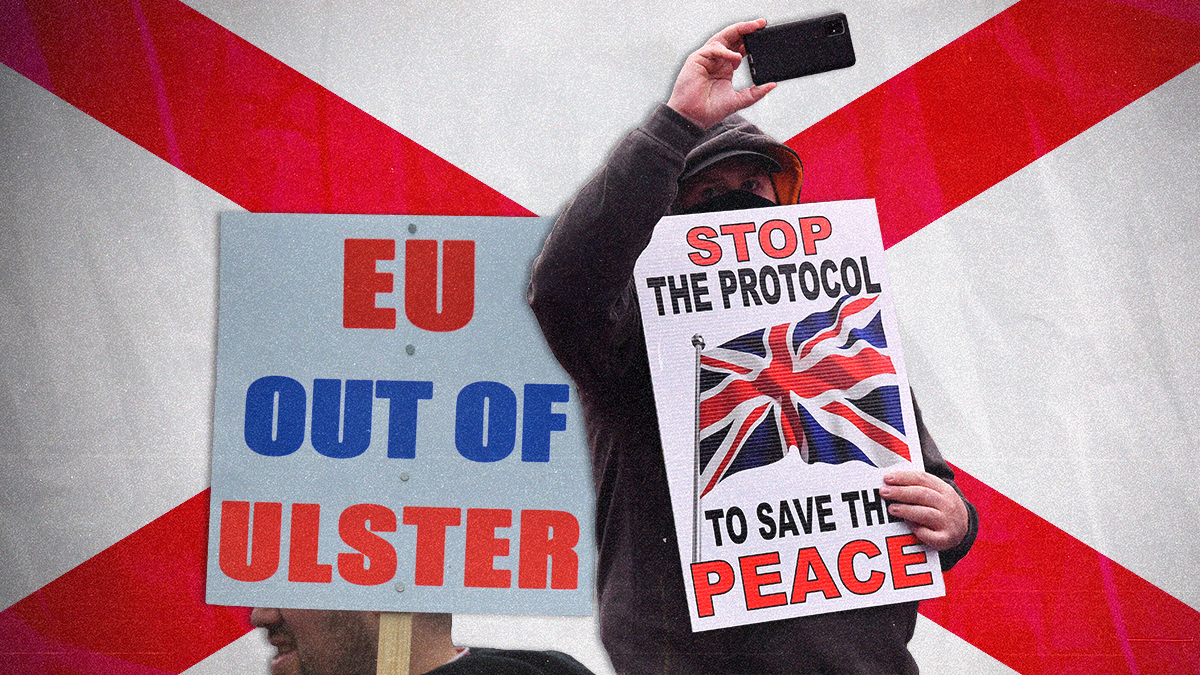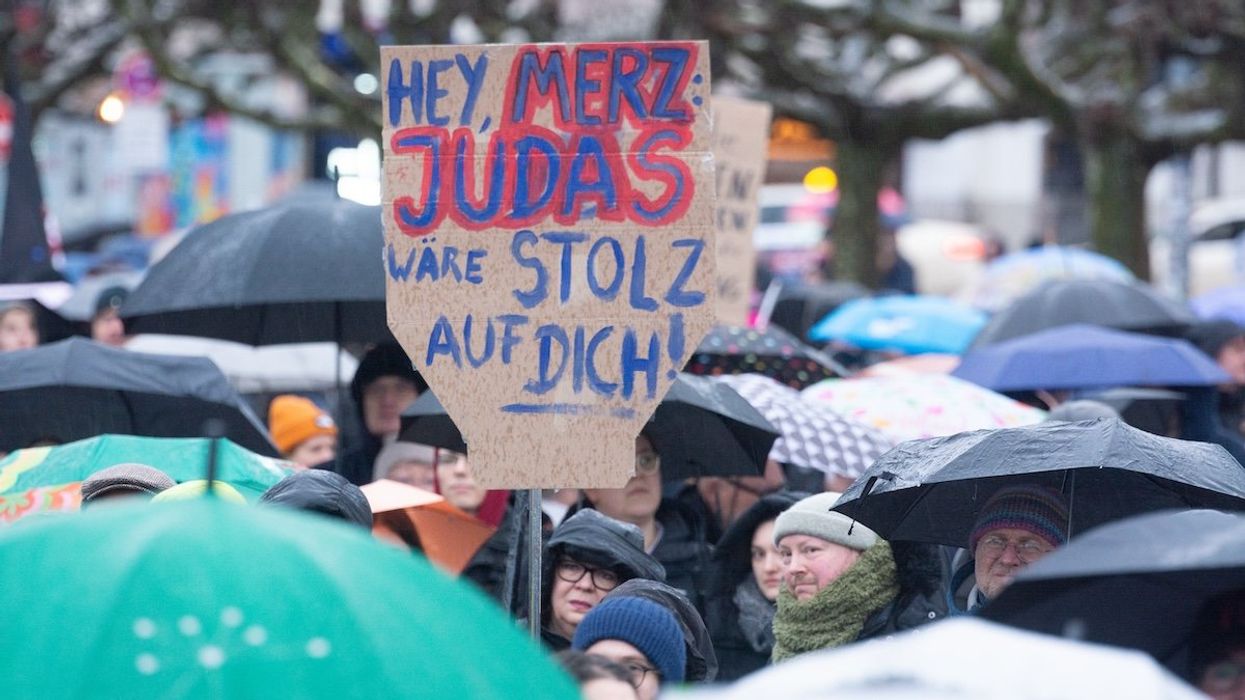The 1998 Good Friday Agreement ended decades of bloody violence in Northern Ireland, as paramilitary groups agreed to disarm. The agreement was such a watershed that US President Joe Biden is expected to visit Belfast and the Republic of Ireland this week to mark its 25th anniversary.
But the stability of the 1.8-million-strong country has been thrown into question as a result of Brexit-induced bedlam.
Indeed, post-Brexit negotiations over trade and border arrangements have sparked some violence and raised fears of broader destabilization, prompting Britain's MI5 intelligence agency to recently raise the domestic terror threat level in Northern Ireland from “substantial” to “severe.”
Twenty-five years after the landmark accord — also known as the Belfast Agreement — how stable is the situation in Northern Ireland, and how has Brexit threatened the status quo?
A Troubled backstory
The region has long been mired in violence, particularly since the partition of Ireland in the 1920s, which gave rise to a bloody civil war. While the North remained under British control, the southern Ireland Free State formed the basis of an independent Ireland. The well-known Irish Republican Army, also known as the Provos, survived the civil war and continued to agitate against the British.
But the modern conflict arose in the 1960s, when Irish republicans (nationalists), most of whom were Catholic, began protesting against the Northern Irish government, made up of pro-UK Protestants that they claimed were discriminating against them. While it was not a religious conflict, tensions flared along denominational lines.
Indeed, civil rights demonstrations morphed into deadly sectarian clashes, and nationalist paramilitary groups on both sides engaged in terrorism to further their aims. In a move that deepened divisions, the British government deployed troops to the North in 1969.
The bloody 30-year period that followed — depicted in iconic films like “In the Name of the Father” and “Hidden Agenda” — became known as the Troubles.
A delicate peace is born
While campaigning for the US presidency in 1992, Bill Clinton vowed to help promote peace in Northern Ireland if elected – and he followed through, adopting a new approach that eventually granted constitutional legitimacy to the IRA as a step towards full normalization. Clinton also allowed Gerry Adams, president of the political arm of the IRA (Sinn Féin), an exemption to visit the US for 48 hours to further peace talks.
As part of the agreement, which set out a political system based on shared power, both sides committed to releasing hundreds of political prisoners and to a sweeping review of policing in Northern Ireland. The hope was that mutual recognition would pave the way for greater communal integration.
Beyond cessation of violence, what else was the Good Friday Agreement trying to achieve?
“Human rights and equality are central to the Good Friday Agreement,” says Professor Colin Harvey of Queen University’s School of Law in Belfast. Harvey, who grew up in conflict-plagued Derry in the 1970s and 80s, says that 2023 compared to the 1990s is like night and day. “Young people growing up today in cities like Belfast and Derry are growing up in a very different environment from that violence.”
“The agreement holds out a vision of a better society,” he says, adding that “the peace process is not only about ending violence but also delivering transformative change for individuals and communities.”
Much of this is still a work in progress, he notes, pointing out that Northern Ireland still doesn’t have a Bill of Rights.
The Brexit effect
The UK’s decision to leave the European Union has served as the most destabilizing force in Northern Ireland since the Troubles. That’s because most Northern Irelanders didn’t want to leave the Union — 56% voted against the move compared to 44% who backed Brexit.
The Good Friday Agreement rejected any sort of hard border between the two provinces to allow for the free flow of goods and tariff-free trade within the United Kingdom and the European Union. But by creating a hard border between the two provinces — meaning that Northern Ireland is subject to UK trade rules while Ireland remains part of the EU’s Schengen Economic Area — there are fears that age-old anxieties are remerging, putting mounting pressure on the power-sharing arrangement.
What’s more, former UK Prime Minister Boris Johnson’s approach to the withdrawal agreement failed to skillfully address these sticking points and only added fuel to the fire — literally. This caused a spate of violent riots in 2021, driven in large part by extreme loyalists and disillusioned youth.
Economic disruption: Since the Belfast Agreement, the EU has doled out huge amounts of aid to Northern Ireland to help boost domestic industries and peace projects with an eye toward building and supporting a stable society.
The European Social Fund, for example, provided around €40 million ($44 million) a year for community organizations, infrastructure, and social inclusion projects but has since halted operations due to Brexit. As a result, many community centers, including those providing mental and maternal health services, now say they will be forced to shut their doors due to inadequate funding.
While London has offered some sort of alternative, “it is clear that the UK government’s replacement for this is inadequate,” Harvey says, referring to the remaining funding gap.
Political stagnation: Disagreements over how to implement a post-Brexit trade agreement have also turned Northern Ireland’s delicate political landscape upside down. The pro-British Democratic Unionist Party, the only political group that refused to back the Good Friday Agreement, has blocked the legislature from convening six times as a protest against the post-Brexit status quo.
Even after the British parliament recently passed a framework to govern post-Brexit trade rules, DUP hardliners continued to stonewall, saying that the need to follow at least some EU regulations undermines Belfast’s place within the United Kingdom.
Indeed, a dysfunctional legislature that can’t further a legislative agenda isn’t good for any society, let alone one as fractious as Northern Ireland’s.
What’s more, Westminster has been forced to pass some crucial legislation on Belfast’s behalf, including a state budget. Passing the buck for important legislation to London doesn’t bode well for the stability of the power-sharing arrangement.
But even before Brexit, Northern Ireland lacked the social cohesion that those involved in the peace process had hoped to foster.
Consider that just 7% of Northern Irish children attend integrated schools, and polls show that many kids don’t have friends from the other religious side. So-called peace walls separating Catholic and Protestant communities remain intact in many places, while separate teacher training and curricula for segregated schools reveal a still deeply divided society.
That’s in part because of a lack of political will among the province's two dominant parties — Sinn Féin, representing Irish nationalists, and the DUP, fervently loyal to the British monarchy.
Still, Harvey does not agree that the outlook for Northern Ireland is all doom and gloom. “It's important to underline that the underpinning peace process here is solid,” he says, adding, “I don’t think it is in jeopardy.”
“But in terms of societal transformation and changing the lives of individuals, there’s still much work to be done.”



















